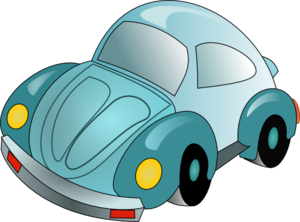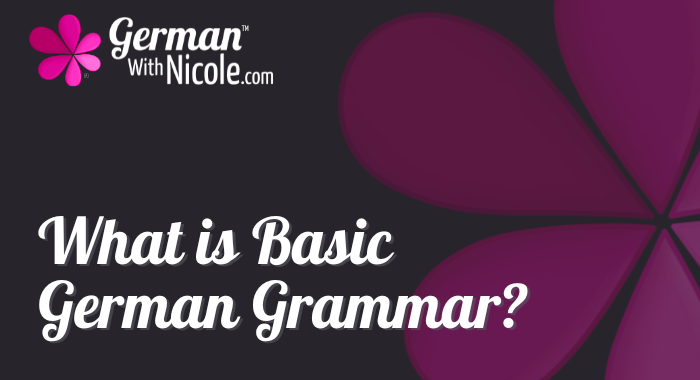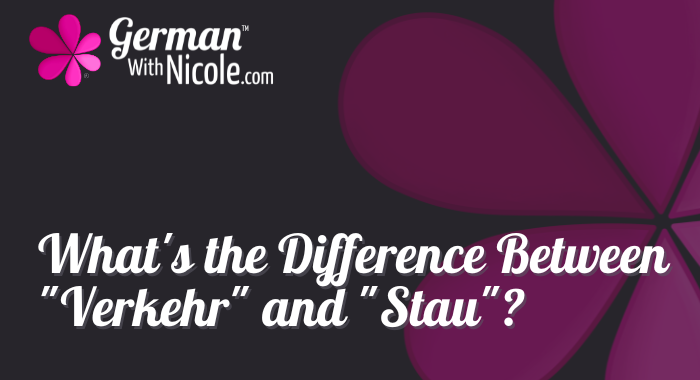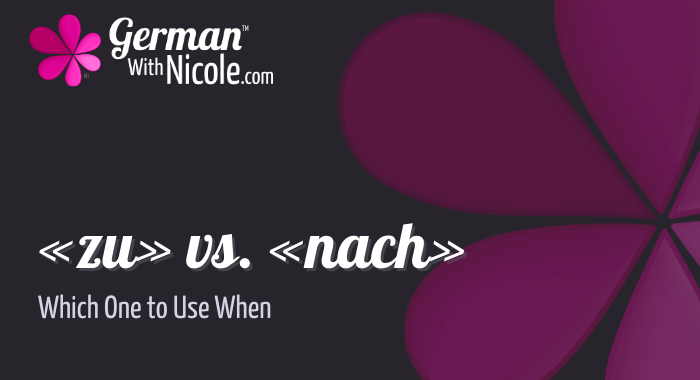Good ol'-fashioned RSS Feed
das Blog
A1
What is Basic German Grammar?
The A1 or beginner's level of German is frequently underestimated in its importance for learning German.
Starting at the beginning is not only the only place to start, but it's the most important place to start to understand German grammar.
If you're my client you'll hear this often:
You can't build a house on sand, so build a strong foundation.
One of the hardest times for my A2 clients (or B1 or B2 for that matter) is when we start a new topic involving some kind of grammar and they di…
Practice a Tongue Twister in German
der Zungenbrecher = tongue twister
Heute können Sie einen Zungenbrecher üben! Hier können Sie das PDF herunterladen:
Dann schauen Sie das Video. Ich helfe Ihnen dabei, das /ts/ aussprechen zu können und den Zungenbrecher zu lernen. Viel Spaß dabei!
*
auf Englisch:
Today you can practice a tongue twister! You can download the PDF here:
And then watch the video. In the video I'll help you correctly pronounce the /ts/ sound and to learn the tongue twister. Ha…
What's the Difference Between "Verkehr" and "Stau"?
When you're at the A1 level, "Verkehr" and "Stau" can be tough to differentiate. Most people say "It has something to do with cars!!" If you said that, you're correct! But what's the difference?
The difference is essentially the same as in English, but one use of "Verkehr" might trip you up.
Read on to learn the difference and how not to get tripped up by the one use of "Verkehr"!
 Was bedeutet "Verkehr"?
Was bedeutet "Verkehr"?
Verkehr is simply the word for traffic. You can have multiple types of Verkehr:
- …
"wohin" vs. "woher"
If you learned German in college, chances are you learned both “woher” and “wohin” at the same time.
Do you ever drive in reverse and forwards at the same time?
I didn't think so.
Why so many US textbook authors think this is a good idea is beyond me.
In drivers education, first you learn to drive forwards, you get a feel for the car, and then you learn to drive in reverse.
It's not that hard, textbook authors!
*Nicole facepalms and sighs with exasperation.*
That's a really good way…
"zu" vs. "nach"
"Zu..." no. "Nach..."
Wait! Which one do I use? GAH!
Have you said that before? I bet you have, as I’ve heard it from every beginning German learner I’ve worked with. And a lot of intermediate level speakers, too.
The difference is: with “zu” and “nach,” size makes a difference. But not how you might think.
When do I use “zu”?
“Zu” is used for places like
- die Bäckerei
- die Post
- your friend Michael’s house
- die Arbeit
- die Bushaltestelle
These are, in fact, all smaller places. A …
"wann" vs. "wenn"
This is a source of frustration for so many German learners. "Wann" and "wenn" are too similar and as a result, lots of people mix them up.
They both mean when, however when you use them is completely different.
Are you ready to learn which word to use when?
Los geht’s!
Which “when” is “when”?
First you need to clearly differentiate the two words “wann” and “wenn.”
| wann | wenn |
|
4 Reasons Minimalists Should Learn German (And Why German is Easier than English!)
If you are already living with less or a minimum amount of possessions, or would like to, this philosophy works in your favor when learning German. Experience a language which is significantly more predictable than English; German is a great language to explore!
You'll also discover here how, in many ways, German is actually easier than English. I say this as a native English speaker, a near-native German speaker, and an instructor for both languages.
Of course both languages have their own un…
5 Easy Books for A1 (Beginning) German Learners
Amended: This post now includes 8 Easy German Book recommendations for A1-level learners,
3 from adult literature and 5 from youth literature.
All of the books listed here are A1 books, however if you look in a bookstore, make sure you look for an emblem or a marking with "A1" on it. No matter where you buy it, I recommend you purchase a physical copy so you can take notes in the book and also so you can use the included audio/mp3 download with the book.
These are books I recommend for you fo…
Sorry, There is no Oxford Comma in German.
Discussions begin, lawyers are called, and lawsuits are filed. All of it is about a comma. (See what I did there?)
The Oxford comma is so important to people that spouses actually have discussions about it. They've talked about everything like where to live, how to manage their finances, and how many kids to have, but years later they find out only one of them uses the Oxford comma. [Cut dramatic music.] It's like now the real stuff of marriage has come to the forefront:
to use the Oxford comm…
How to Pronounce the Ach-Laut in German
The long-awaited Ach-Laut video is here! Hurra!
The "Ach-Laut" means the "ach sound" and it is the airy, throaty sound you hear in the words "ach" and "machen."
Phonetically, this sound is written as /X/ and to that we say "ach." In this video I've broken down for you:
1. What the sound /X/ is and what it isn't.
2. How to feel where it takes place and
3. How to practice the sound, first slowly and then speeding it up step-by-step.
The words we concentrate on in this video are Ach, Bach, Sa…
Categories
- A1 (70)
- A2 (55)
- B1 (47)
- B2 (24)
- C1 (22)
- Deutsch lernen (82)
- Einkaufen (15)
- Essen (12)
- Grammatik (24)
- Hören (14)
- Landeskunde und Kultur (50)
- Lesen (11)
- Musik (5)
- Nachrichten (4)
- Podcast (66)
- Pronunciation (3)
- Schreiben (4)
- Schwäbisch (4)
- Spiele und Spaß (Games and Fun) (12)
- Sprechen (12)
- Vokabeln (41)
- Video (13)
Would you like to hear about future German classes with Frau Warner?
With the E-Post, you'll receive information on German class registration and goings-on in German classes, all written by Frau Warner. You'll receive an email on Tuesdays, plus an extra email or two when class registration opens or there's something new.
If you use Gmail: please check your "promotions" folder.









